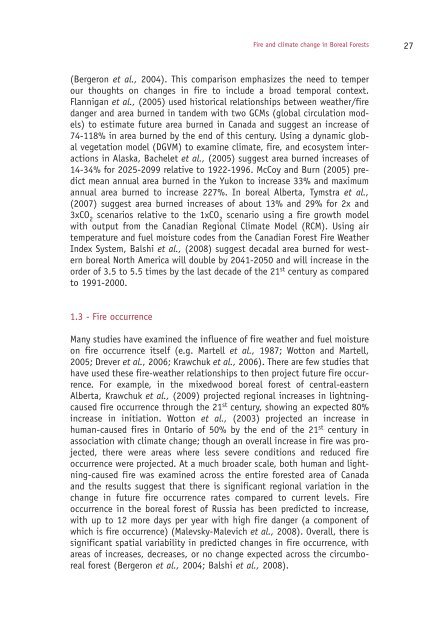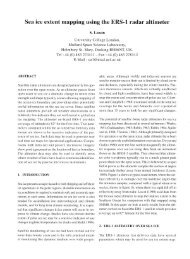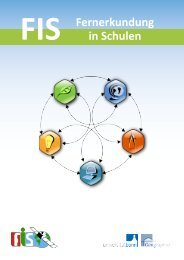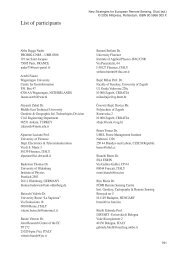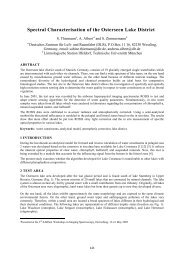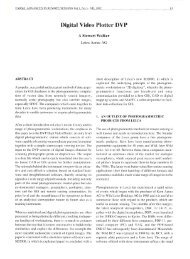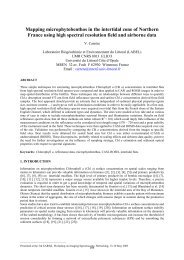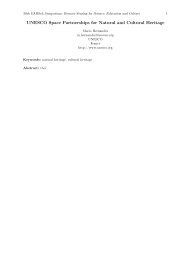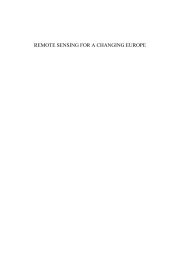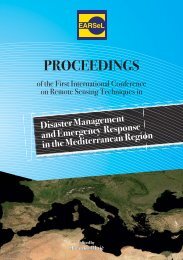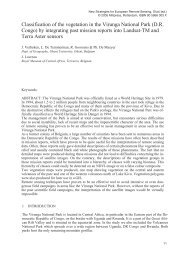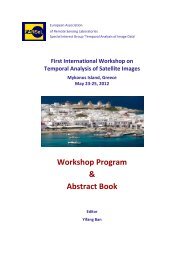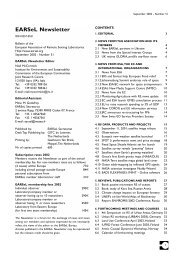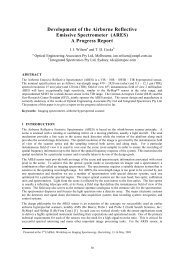7th Workshop on Forest Fire Management - EARSeL, European ...
7th Workshop on Forest Fire Management - EARSeL, European ...
7th Workshop on Forest Fire Management - EARSeL, European ...
Create successful ePaper yourself
Turn your PDF publications into a flip-book with our unique Google optimized e-Paper software.
<strong>Fire</strong> and climate change in Boreal <strong>Forest</strong>s 27<br />
(Berger<strong>on</strong> et al., 2004). This comparis<strong>on</strong> emphasizes the need to temper<br />
our thoughts <strong>on</strong> changes in fire to include a broad temporal c<strong>on</strong>text.<br />
Flannigan et al., (2005) used historical relati<strong>on</strong>ships between weather/fire<br />
danger and area burned in tandem with two GCMs (global circulati<strong>on</strong> models)<br />
to estimate future area burned in Canada and suggest an increase of<br />
74-118% in area burned by the end of this century. Using a dynamic global<br />
vegetati<strong>on</strong> model (DGVM) to examine climate, fire, and ecosystem interacti<strong>on</strong>s<br />
in Alaska, Bachelet et al., (2005) suggest area burned increases of<br />
14-34% for 2025-2099 relative to 1922-1996. McCoy and Burn (2005) predict<br />
mean annual area burned in the Yuk<strong>on</strong> to increase 33% and maximum<br />
annual area burned to increase 227%. In boreal Alberta, Tymstra et al.,<br />
(2007) suggest area burned increases of about 13% and 29% for 2x and<br />
3xCO 2 scenarios relative to the 1xCO 2 scenario using a fire growth model<br />
with output from the Canadian Regi<strong>on</strong>al Climate Model (RCM). Using air<br />
temperature and fuel moisture codes from the Canadian <strong>Forest</strong> <strong>Fire</strong> Weather<br />
Index System, Balshi et al., (2008) suggest decadal area burned for western<br />
boreal North America will double by 2041-2050 and will increase in the<br />
order of 3.5 to 5.5 times by the last decade of the 21 st century as compared<br />
to 1991-2000.<br />
1.3 - <strong>Fire</strong> occurrence<br />
Many studies have examined the influence of fire weather and fuel moisture<br />
<strong>on</strong> fire occurrence itself (e.g. Martell et al., 1987; Wott<strong>on</strong> and Martell,<br />
2005; Drever et al., 2006; Krawchuk et al., 2006). There are few studies that<br />
have used these fire-weather relati<strong>on</strong>ships to then project future fire occurrence.<br />
For example, in the mixedwood boreal forest of central-eastern<br />
Alberta, Krawchuk et al., (2009) projected regi<strong>on</strong>al increases in lightningcaused<br />
fire occurrence through the 21 st century, showing an expected 80%<br />
increase in initiati<strong>on</strong>. Wott<strong>on</strong> et al., (2003) projected an increase in<br />
human-caused fires in Ontario of 50% by the end of the 21 st century in<br />
associati<strong>on</strong> with climate change; though an overall increase in fire was projected,<br />
there were areas where less severe c<strong>on</strong>diti<strong>on</strong>s and reduced fire<br />
occurrence were projected. At a much broader scale, both human and lightning-caused<br />
fire was examined across the entire forested area of Canada<br />
and the results suggest that there is significant regi<strong>on</strong>al variati<strong>on</strong> in the<br />
change in future fire occurrence rates compared to current levels. <strong>Fire</strong><br />
occurrence in the boreal forest of Russia has been predicted to increase,<br />
with up to 12 more days per year with high fire danger (a comp<strong>on</strong>ent of<br />
which is fire occurrence) (Malevsky-Malevich et al., 2008). Overall, there is<br />
significant spatial variability in predicted changes in fire occurrence, with<br />
areas of increases, decreases, or no change expected across the circumboreal<br />
forest (Berger<strong>on</strong> et al., 2004; Balshi et al., 2008).


